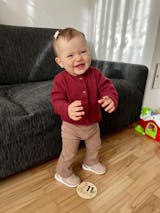Nipple Shields and Colic: What to Know to Really Cure Colic
Some mothers find themselves forced to use nipple shields to relieve pain during breastfeeding.
The doubt that many mothers have is whether nipple shields can cause colic .
The short answer is: certainly NOT.
Colic is not caused by air that the baby may swallow while being fed with nipple shields.
Infant gas colic, like gastroesophageal reflux , is caused by an irritant and inflammatory condition of the intestine (see recent scientific study reported below) that can be PREVENTED (from pregnancy or the first days of life) and/or CURED in the first months of life.
If you were forced to use nipple shields it means that your baby had a limited mouth opening caused by probable muscle contractures; this is why you were forced to use nipple shields.
Sucking problems are easily solved with specialized obstetric support and manual osteopathic treatments to improve the baby's sucking and latching on to the breast.
In this article I will explain how to remove nipple shields, but also what really causes gas colic and how to solve it.
Before starting, I'll leave you three useful pieces of information:
- If you would like to schedule an office visit with me or my midwife colleague, you can find us here.
- You can also find us on Instagram with the profile @drsilva.com_official
- You can find an in-depth video course on breastfeeding and newborn cliches here .
1. What are nipple shields used for?
Nipple shields are devices that are recommended by medical personnel at the beginning of breastfeeding if there are complications with the attachment .
In general, nipple shields are recommended to mothers when the baby opens his mouth little and causes pain in the breast (with or without cracks) or when he has difficulty latching on to the breast.
However, nipple shields should be a temporary tool, used by the mother while the real reason why the newborn is having difficulty opening his mouth well and latching on to the breast is resolved.
Unfortunately, this almost never happens and the mother is forced to continue breastfeeding with a nipple shield (and perhaps even with breast pain).
It is important to say that there are two people involved in breastfeeding: the mother and the baby.
Therefore, for successful (and painless) breastfeeding, it is essential that the mother positions the baby correctly and that the newborn is able to latch on optimally and move his jaw well to feed.
Unfortunately, due to a lack of support during the initiation of breastfeeding , the focus is only on the mother and not on the baby.
The problem is that if there are contractures in the mouth, jaw or neck , there may be difficulties for the baby to open his mouth correctly and have adequate suction.
The consequences are pain for the mother, cracks, mastitis and engorgement up to the point of abandoning breastfeeding.
This is why, in parallel with obstetric support, the work of the pediatric osteopath is essential.
The osteopath relaxes the muscular contractures of the mouth and neck, and improves the mobility of the jaw so that the newborn can open his mouth better and have a more effective suction.
In this way the mother will be able to attach the newborn to the breast without a nipple shield but above all without pain and with a nutritious suction.
Do nipple shields cause colic?

The answer is: no!
Nipple shields do not cause colic or gas in the baby's tummy .
For many mothers, nipple shields are very uncomfortable to use, but they do not cause any gastrointestinal problems.
In fact, the gas in the baby's belly is not caused by your baby swallowing air while you are breastfeeding with the nipple shield.
Air in the stomach is caused by an inflammatory condition of the intestine.
The newborn is like us, think about it carefully.
When you have air in your stomach it means that you ate something that didn't make you feel good; it doesn't mean that you swallowed air while eating.
Also because, when the newborn eats voraciously and swallows a little air, he expels it immediately after feeding with a burp .
2. The real causes of colic
Infant gas colic is one of the most common and disabling problems for babies in the first few months of life.
Unfortunately, in most cases colic is defined as physiological only because your baby (fortunately) gains weight, despite suffering and crying a lot.
Colic is considered a normal problem that some newborns are destined to have without any specific cause, perhaps caused by a fateful immaturity of the intestine (spoiler: false).
Your baby is not meant to suffer and you parents are not forced to sleepless nights and inconsolable crying.

Colic in newborns is not caused by immaturity of the intestine, but by intestinal inflammation .
Testifying to this without a shadow of a doubt is the recent 2018 scientific study “ Infantile Colic, New Insights into an Old Problem ” which was published in the journal Gastroenterology Clinics of North America .
What was found?
The presence of fecal calprotectin has been observed in breast-fed infants presenting with neonatal colic.
This objective parameter indicates without a shadow of a doubt an intestinal inflammatory condition .
This discovery led me to work for 4 consecutive years to investigate the real causes of intestinal inflammation and discover the remedies to prevent and truly cure gas colic in newborns.


